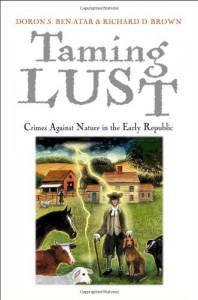 The Fordham History Department celebrate the publication of an exciting new book by one of our most distinguished faculty, Professor Doron S. Ben-Atar. Taming Lust: Crimes Against Nature in the Early Republic, which Professor Ben-Atar wrote together with Richard D. Brown, begins as an inquiry into two separate cases of bestiality brought before the courts in Massachusetts and Connecticut in the 1790s.
The Fordham History Department celebrate the publication of an exciting new book by one of our most distinguished faculty, Professor Doron S. Ben-Atar. Taming Lust: Crimes Against Nature in the Early Republic, which Professor Ben-Atar wrote together with Richard D. Brown, begins as an inquiry into two separate cases of bestiality brought before the courts in Massachusetts and Connecticut in the 1790s.
The book’s publisher offers the following description:
In 1796, as revolutionary fervor waned and the Age of Reason took hold, an eighty-five-year-old Massachusetts doctor was convicted of bestiality and sentenced to hang. Three years later and seventy miles away, an eighty-three-year-old Connecticut farmer was convicted of the same crime and sentenced to the same punishment. Prior to these criminal trials, neither Massachusetts nor Connecticut had executed anyone for bestiality in over a century. Though there are no overt connections between the two episodes, the similarities of their particulars are strange and striking. Historians Doron S. Ben-Atar and Richard D. Brown delve into the specifics to determine what larger social, political, or religious forces could have compelled New England courts to condemn two octogenarians for sexual misbehavior typically associated with much younger men.
You can also hear Ben-Atar discussing human attitudes toward domestic animals on NPR’s Backstory program.
Professor Ben-Atar teaches undergraduate and graduate courses on Fordham’s Lincoln Center and Rose Hill campuses. This semester, he is teaching the senior seminar HIST 4331- “US in the Middle East, 1945-Present.” Topics for future courses include the History of US Sexuality, Hysteria, Sexuality, and the Unconscious, and a course on Antisemitism.
